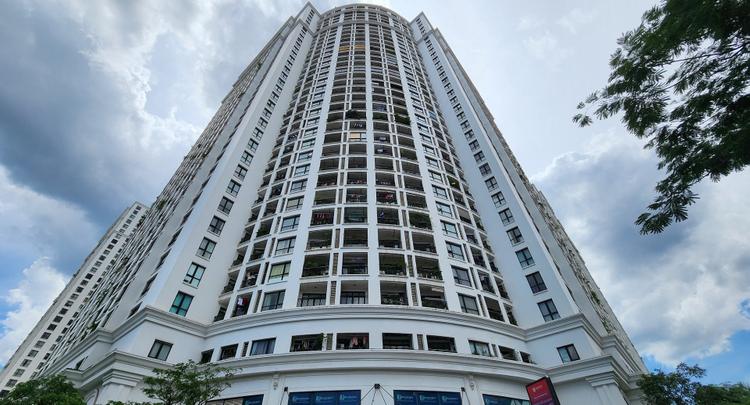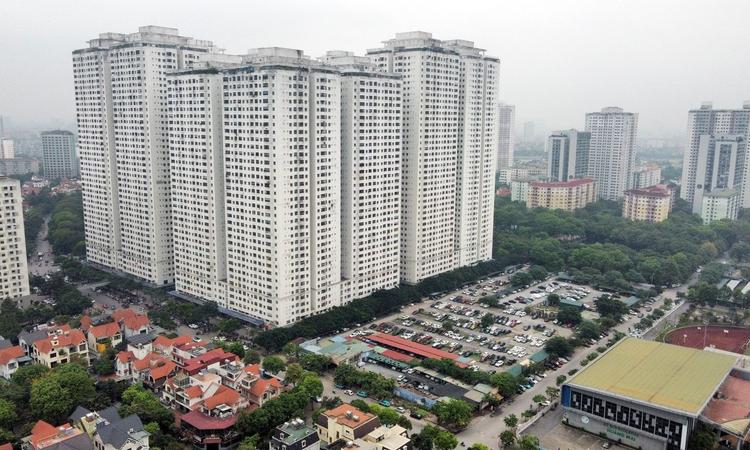Hanoi apartment prices have been continuously rising and the upward trend shows no signs of stopping as purchasing power continues in the market, although not as strong as before. The paradox that the Hanoi apartment market has recorded is that real buyers are hesitant but many amateur and small investors are still buying.
Contrasting Trends in Buying and Selling Apartments in Hanoi
In fact, despite the high price increase, the apartment market still recorded a significant amount of liquidity thanks to the support of “cheap money flow”. However, while investors boldly took advantage of cheap money flow to buy, real buyers hesitated. Talking to Batdongsan.com.vn, many brokers said that up to 60% of the transaction volume of the apartment market in the past time was concentrated in the group of investment customers. In particular, there are projects with good sales policies – interest-free grace periods, the number of investors accounted for up to 70%. Investors with inherent risk-taking ability are all bold in using financial leverage to buy more with the belief that apartment prices will continue to increase in the coming time.

Mr. Trong Hung, an apartment broker in the East of Hanoi, said that in just the past 2 months, apartment prices have been increasing sharply by the week, even by the day, many investors have easily surfed to make a big profit in a short time, some investors surfed right after writing a deposit. This further stimulates a group of investors to use bank leverage to buy in. “The Hanoi apartment market is heavily speculative, it is a price inflation by investors”, Mr. Hung emphasized.
Meanwhile, the continuous increase in apartment prices has made real homebuyers confused and hesitant. Do Ngoc Bich and her husband, who are currently renting a house at Nam Trung Yen apartment building, said that they have been looking at houses continuously for the past month and have now stopped their intention to buy a house when apartment prices have increased too much. “Although the loan interest rate is cheap, my husband and I are not financially capable of getting a loan from the bank if we buy a house at this time. With a 2-bedroom, 2-bathroom apartment in an old apartment project that is 15 years old and costs nearly 6 billion, my husband and I, although we really want to own a house, do not dare to borrow to buy it because we cannot afford to pay the monthly interest on the loan,” Bich shared.
According to broker Trong Hung, many real buyers have put off or given up the idea of buying a house due to the fact that apartment prices are constantly climbing in Hanoi. “The group of real buyers is usually safe and not reckless. They buy to determine long-term settlement, so when they see the risk of borrowing to buy, they stop. Meanwhile, many investors, although not financially capable, are willing to use leverage with the aim of selling for profit in a short time.”
Unforeseen Risks
The Hanoi apartment market is witnessing a paradox: selling prices are constantly climbing, while many investors are still borrowing heavily from banks to invest in this segment. They believe that the demand for urban housing will ensure profitability, but in reality, the abuse of financial leverage is putting many people in a precarious situation.
Mr. Tran Dai Ta, Sales Director of a trading floor in Thanh Xuan Ward, said that the worrying thing is that the current loan rate for apartment purchases is much higher than in the previous period. Many investors use loans of over 70% of the apartment value, considering it as a “ticket” to quickly seize the opportunity. However, if the loan interest rate shows signs of adjustment, financial costs will immediately become a burden. Meanwhile, future price increases may not be as expected and the income from apartment rentals may not be enough to cover bank interest, especially in high-end projects – where the rental price is not commensurate with the purchase price.
According to Mr. Ta, the risk also lies in relying too much on the expectation of price increases. Once the secondary market slows down in liquidity, or new supply is launched in droves, profit margins can quickly erode. At that time, investors not only lose the opportunity to make a profit but also risk being forced to sell quickly to pay off debt, creating a spiral of local sell-offs. The rush to use borrowed capital to buy apartments can have long-term consequences for both the market and the banking system. If the flow of borrowed capital is too strong into illiquid assets, bad debt will increase and have a spillover effect on macroeconomic stability. This has happened in many markets in the region, where price bubbles were formed from the abuse of real estate credit.
The director emphasized that in the context of Hanoi’s shortage of affordable apartments, the race to borrow money to buy high-priced apartments is making the market even more distorted, far from real housing needs. Investors who rely solely on borrowed capital without a sustainable cash flow strategy will face the risk of “being stuck with goods” as soon as the market adjusts. Obviously, financial leverage is not always the “key” to opening up investment opportunities. In Hanoi, where apartment prices have far exceeded average incomes, borrowing too much money to follow the speculative wave can become a double risk – both for investors and for the entire market.

